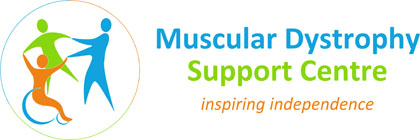Adam Parkes, a physiotherapy student from the University of Northampton, recently completed a five-week placement at the MD Support Centre. It was his first clinical placement, and one he describes as a transformative introduction to neuromuscular physiotherapy.
Adam originally completed an undergraduate degree in Sports Science and spent two and a half years working in the field before deciding to pursue physiotherapy. He said: “I’ve always found the human body fascinating – how it moves, why it moves, what causes injury, and how to help people recover. Physio felt like the natural next step. Sports therapy has its limits, so I wanted to keep learning and push myself further.”
He is now in the first year of a two-year pre-registration MSc Physiotherapy course that builds on his previous anatomy and clinical knowledge.
“I already did an undergrad in sports science, and now I’m doing the full physio course condensed into two years because of my prior anatomy knowledge. It’s pretty intense but it moves fast and builds on what I already know.”
As part of the degree, students take part in placements to gain first-hand experience of clinical settings, and his university arranged for Adam to spend his time at MD Support Centre.
Although he’d heard of muscular dystrophy before, Adam said he hadn’t encountered it in depth until now. He said: “I’d heard of muscular dystrophy before, but I didn’t really know much about it. I did a lot of research before coming here because I didn’t want to walk in clueless, but even with that, it was still hard to fully grasp. There are just so many types. It was definitely eye-opening.”
Valuable experience
One of the most valuable aspects of the placement was how hands-on it was, something increasingly rare due to the growing time and resource constraints in healthcare.
“In the NHS, physio is moving toward a much more hands-off approach, partly because of time and resource constraints. So being here and having the chance to actually do the physical work every day has been amazing. I really believe that hands-on experience is still about 60 to 70% of the job. You need that practical side to do it well.”
The placement offered opportunities for growth in a supportive, real-world setting.
“This environment gave me space to develop and refine my skills, without the pressure of limited sessions or discharge deadlines. Knowing I could see someone more than once and try things out in a safe space helped me grow so much.”
One opportunity involved working with the same service user four times over five weeks. “He was recovering from surgery and I became the common thread in his care, so the team would ask me what was going on. I ended up becoming the lead for that case in a way, which gave me a huge confidence boost.”
Adam also appreciated the opportunity to observe and learn from different clinicians within the team.
“The physios here are all so different in their techniques, which gave me a chance to try a bit of everything and start to shape my own approach. I could take little bits from Siobhan, from Abbas, from everyone really, and work out what felt natural for me. It’s not about right or wrong, it’s about what works and keeps both you and the service user safe.”
Confidence and independence
Another highlight was the flexibility and autonomy he was given to take charge of his learning.
“At the start it was more structured, but once I’d gained people’s trust, I was able to build my own diary. I could look at the week and say, ‘I want to see this person or that person,’ depending on what I wanted to learn. That kind of freedom is rare, and it’s made such a difference.”
The placement has also helped him think more broadly about future career options.
“I was very set on MSK because of my background in sports therapy, but now I’m more open. Neuromuscular physio is such a specific niche, and I’d definitely be interested in exploring more of it.”
Adam said the team at MD Support Centre played a key role in his experience, describing them as supportive, caring, and invested in his development. “Siobhan especially, in her educator role, checked in on me a lot, not just about clinical stuff but my wellbeing and keeping on top of uni work. Everyone had their own way of supporting me. Even if it wasn’t overt, you could tell people cared.”
For students considering a similar placement, Adam offered this advice: “Don’t be afraid to talk to service users, even if you haven’t worked with disabled people before. Ask questions. You’ll quickly learn that everyone is different. Something as simple as how someone prefers to be sat up varies from person to person. And honestly, just be a human being. As long as you’re trying and you show that you care, people are happy.”
“This placement really gave me the opportunity to grow, not just in technical skills but in confidence and independence. I couldn’t have asked for a better start to my physio journey.”

